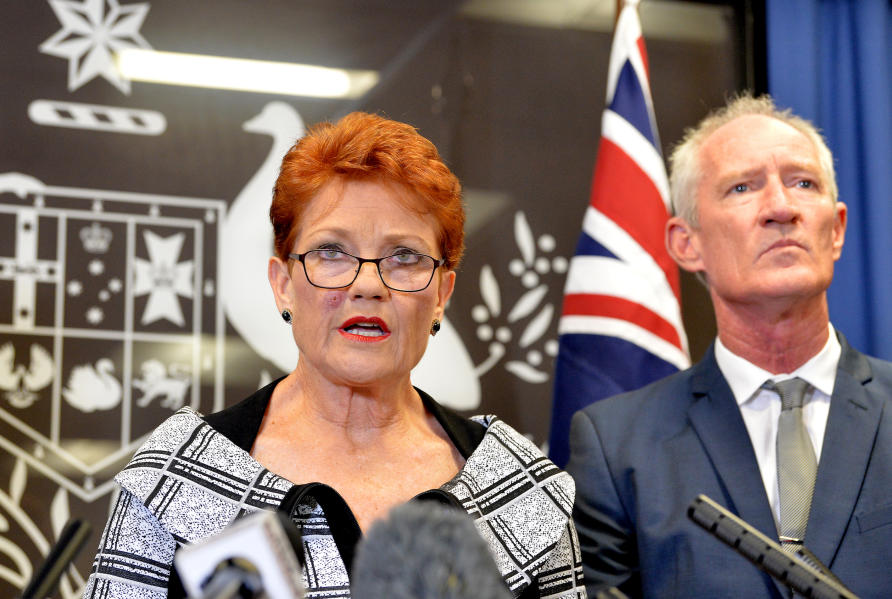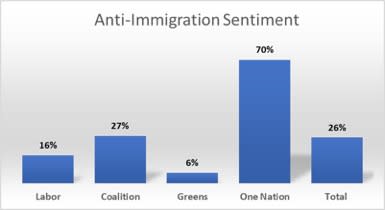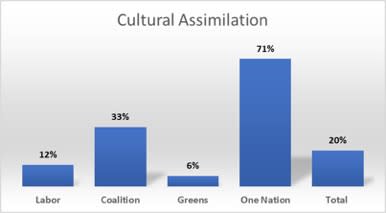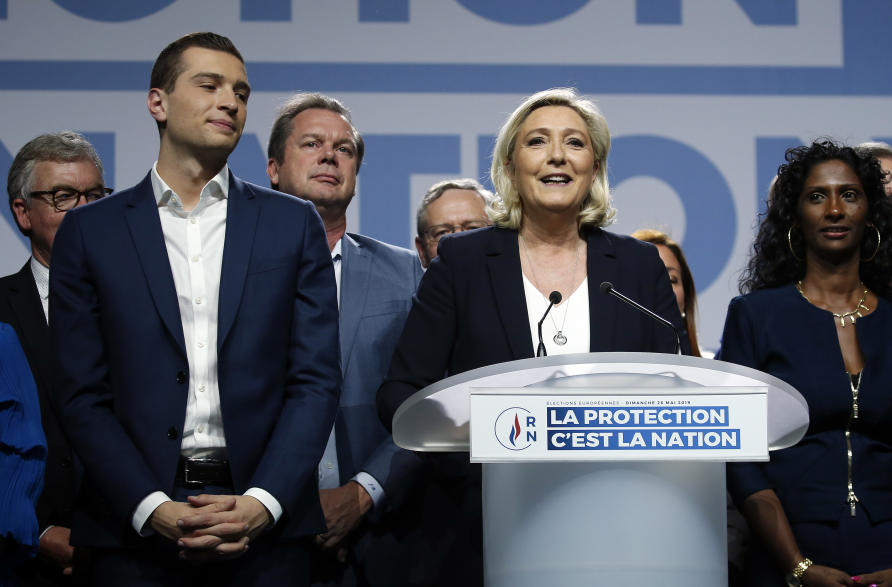Don’t write off One Nation

One Nation is Australia’s own contribution to the growing ranks of nationalist right-wing parties in developed democracies.
So far it has had less electoral success than some of its overseas counterparts, garnering just over 4 per cent of the Senate primary vote in 2016. Its fortunes have also been marred by an especially checkered and tumultuous history.

The resignation of One Nation deputy leader Steve Dickson (r) following the release of footage of his behaviour in a strip club in Washington DC, is only the latest in a series of scandals and stunts that have helped to alienate the party from the mainstream.
Since its founding in 1997, One Nation has been riven by internal discord, party leaders have faced numerous scandals, and its initially promising support has waned over time.
In the most recent Newspoll, One Nation received just 5 per cent of the vote and its support is trending downward from a recent high of 7 per cent in March. It would be easy to write off the party in the 2019 federal election.
But not so fast.
In other developed democracies, research indicates that support for nationalist parties is suppressed when these parties have a reputation for ethnic bias or intolerance. The same is likely true in Australia and suggests that if One Nation can clean up its act, its electoral fortunes may well improve.
In her 1996 maiden speech to parliament, One Nation leader Pauline Hanson claimed Australia was being swamped by Asians. When she returned to parliament in 2016, she donned a burqa and claimed that Australia was being overrun by Muslims.
These statements and antics add to One Nation’s image as an extremist party that openly expresses prejudice. This and a reputation for erratic leadership likely further dampens support for One Nation even among those who agree with its positions.
One Nation’s focus is like that of other nationalist parties– restrictive immigration, opposition to multiculturalism, and reduced foreign influence in national affairs. One Nation supporters hold priorities and positions consistent with this emphasis.

This US Studies Centre/YouGov poll in October 2018 shows the proportion of supporters in each party who both strongly agreed that Australia should accept fewer immigrants and said that immigration is extremely important to their vote.
The US Studies Centre/YouGov conducted a poll in October 2018 in which Australians were asked about their issue priorities and positions. One Nation voters stood out from other partisans in their opposition to immigration and the importance they place on the issue. Some 70 per cent of One Nation voters said that immigration is extremely important to their vote and strongly agreed that Australia should accept fewer immigrants.
One Nation supporters aren’t alone, however, in holding these views. In the US Studies Centre/YouGov poll, 27 per cent of Coalition voters also said that immigration is extremely important to their vote and strongly agree that immigration should be cut. About 16 per cent of Labor voters held the very same views.
In total, we classified 26 per cent of polled Australians as anti-immigrant, a number that far exceeds One Nation’s current electoral support of 5 per cent. An anti-immigrant agenda is more prevalent among Coalition than Labor supporters but exists on both sides of the political spectrum.
Data collected as part of the Vote Compass project in April (between 10/4 and 22/4) likewise showed distinct opposition to multiculturalism among One Nation supporters. Some 71 per cent disagree that immigrants can retain their cultural values and still be Australian. A third of Coalition supporters hold the same view.
Overall, 20 per cent of Australians participating in Vote Compass don’t think immigrants can maintain non-Australian cultural values and still be Australian.
It is clear then that agreement with One Nation’s distinctive policy agenda extends well beyond its supporters and hints at nascent but unrealised support for the party.
In the US Studies Centre/YouGov poll, One Nation supporters fit a nationalistic profile on other issues as well. They exhibit greater wariness of China and Chinese trade than most Australians and are more likely to hold a positive view of American tariffs on Chinese imports.

This Vote Compass data, taken from 4 April to 22 April 2019, shows the proportion of supporters of each party who disagree that immigrants can retain their cultural values without being any less Australian.
They are also more preoccupied with the issue of racially-linked violence. Roughly 60 per cent of One Nation voters said that the issue of so-called African gangs would be extremely important to their vote choice, double the number of Australians who said this overall.
And in the Vote Compass data (collected from 10/4 to 28/4), over 8 in 10 One Nation supporters opposed more government spending to address the disadvantages faced by Indigenous Australians, whereas 6 out of 10 Australians supported an increase in such spending.
On most other issues in the US Studies Centre/YouGov poll, One Nation voters didn’t look very different from the average Australian voter. They are a little less concerned about environmental issues (like fracking and renewable energy) and climate change than the average Australian, but not more so than Coalition supporters.
They are split like most Australians over the utility of tax cuts for businesses, agree that inequality is excessive, and favour spending on infrastructure over cutting taxes. They are no more likely than other voters to prioritise guns, trade, the economy, and taxes in deciding how to vote.
In sum, One Nation voters stand out in their opposition to immigration, fear of foreign influence, lack of concern for the lives of Indigenous Australians, and a preoccupation with racially-tinged crime. This constellation of attitudes looks very much like that seen among supporters of nationalistic, right-wing parties in other parts of the world.
More importantly, One Nation supporters aren’t entirely alone. Their issues preferences and priorities are shared by a sizeable minority of Coalition voters and a somewhat smaller group of Labor supporters.

France’s National Front leader Marine Le Pen is changing the party’s image in an attempt to move into the mainstream.
These views haven’t yet translated into large numbers of votes for One Nation. But this could change if the party’s leadership was more adept and able to rebut charges of being prejudiced and intolerant.
This has been the strategy pursued in France by Marine Le Pen who has moved toward the mainstream and gained votes by distancing the National Front party from her father who was widely seen as racist and anti-Semitic.
Even if One Nation doesn’t expand its vote share in 2019, it is likely to be influencing the policy agenda of the major political parties.
As we have shown, a significant minority of Coalition supporters share the immigration views of One Nation supporters. This places pressure on party leaderships to move towards One Nation on matters linked to immigration and multiculturalism.
Ahead of the election, the Liberal-National Coalition government of incumbent Prime Minister Scott Morrison announced cuts to the number of legal immigrants and asylum seekers. This shift is very likely designed to prevent the defection of anti-immigration Coalition supporters to One Nation.
In this way, One Nation can have a significant influence on Australian politics even if it doesn’t garner many seats in this election.
This article was written by Professor Stanley Feldman and Professor Leonie Huddy of the University of Melbourne and published by Pursuit. Another version of this piece first appeared on Election Watch.
Stanley Feldman is a Professor of Political Science. His research interests include the structure of political ideology and values, and the psychological bases of attitudes and opinions.













